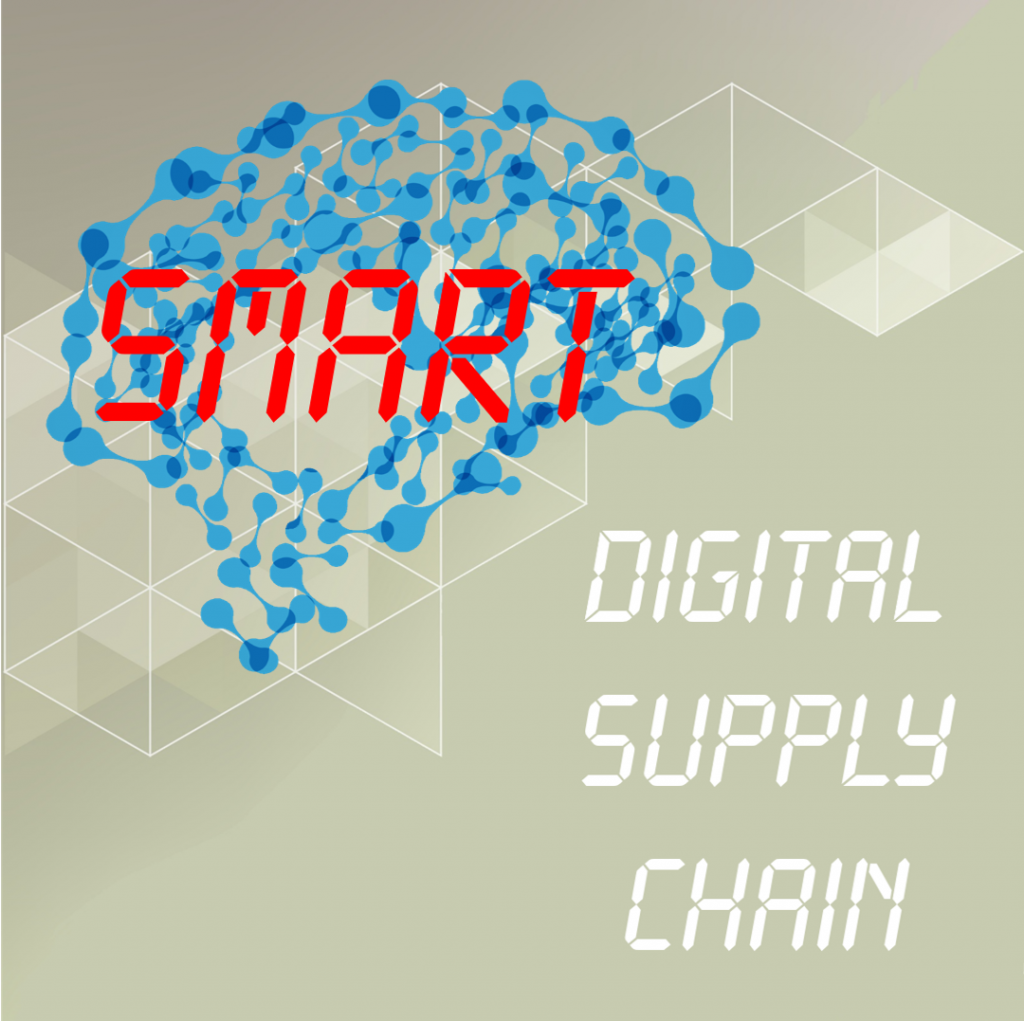Numerous articles discussing digital supply chains also discuss how cognitive technologies (e.g., artificial intelligence (AI), cognitive computing, and machine learning) play a vital role in digital strategies. The staff at HERE Technologies explains, “The word ‘cognitive’ comes from the Greek word for ‘knowledge’ (gnosis). Significantly, it has a ‘co’ in the front, implying the notion of collaboration. In our current age of information, knowledge is most powerful when shared between multiple parties to arrive at good decisions. There’s plenty of room for improvement in making those decisions. We need a cognitive approach when it comes to supply-chain optimization. If we get it right, there’s an opportunity to transform the business. If we embrace the revolutionary possibilities presented by developments in artificial intelligence and machine learning, we can anticipate problems and manage disruptions before they even occur.”[1] The Council of Supply Chain Management Professionals’ (CSCMP) latest Hot Topics publication, written by Lori Webber (@lfwebber), chief marketing officer of IBM Watson Supply Chain, states AI is “perhaps the most transformative [technology] of our era.”[2] According to TechRepublic, the world has reached a “tipping point after which the use of [AI] will become commonplace.”[3] And the staff at Supply Chain Quarterly reports, “A recent IBM survey [found] 69% of supply chain professionals think AI plays an important role in improving supply chain visibility, while 91% of the respondents believe AI will be the technology that helps them achieve that visibility.”[4]
Digitization begins with data
The HERE Technologies staff writes, “It helps to realize just how much information humans produce in the form of data. A May, 2018 article in Forbes magazine stated that 90% of the data in the world was generated in the preceding two years. … According to the World Economic Forum, the entire digital universe is expected to reach 44 zettabytes by 2020 — 40 times more bytes than there are stars in the observable universe.” In other words, obtaining data is not generally a problem. However, the HERE Technologies staff notes, “Data can’t be collected with abandon. It must be collected and cataloged with the intent to be actionable.” What they blithely skip over is that it is the analysis of data that makes it actionable. That’s where cognitive computing plays a central role. The staff at Kuebix explains, “There are several buzzwords circulating the technology industry that relate to the use of this new-found trove of information. These terms are ‘Predictive Analytics,’ ‘Machine Learning,’ and ‘Artificial Intelligence.’ Each of these buzzwords refers to advanced processes for leveraging Big Data to improve processes and business outcomes.”[5]
Linda Rosencrance (@Reporter1035) asks, “What if you could apply machine learning and other types of AI to the terabytes of transactional and sensor data being collected from the supply chain?”[6] Her answer: “The result could be a much more autonomous and effective form of supply chain analytics and, ultimately, a more responsive supply chain.” She explains, “Much of the focus in the supply chain is driven by the ability to integrate predictive and prescriptive analytics to, in essence, blend AI and optimization technologies. Specifically, organizations are using AI in two areas of the supply chain: to enhance predictive analytics to understand behaviors and for prescriptive analytics, where optimization technologies take input from machine learning and try to help decision-makers make better decisions.” The HERE Technologies staff adds, “AI is a powerful response to the question of what we do with all this data, but it’s not enough on its own. … In the cognitive era, supply-chain managers are recognizing that AI is not a cure-all. A cognitive supply chain is digitally led, but it must also be process-centric — and processes are best decided by humans.”
The augmented digital supply chain
Erol Beynam, Vice President of Engineering at Solvoyo, agrees AI is neither a cure-all nor a silver bullet. He explains, “Implementing AI is not a small feat and you may get bombarded with vague definitions and stories about how AI makes the world a better place.”[7] He also agrees that cognitive technologies should be used to augment rather than replace most supply chain professionals. He explains, “Artificial Intelligence can make some tasks much simpler and reduce some mediocre or menial jobs. But that doesn’t mean we will be replaced by human-like robots soon. … AI will bring positive changes in our lives and reform the way we do things by helping us perform more value-adding work in general. On a supply chain network, you will be able to increase organizational efficiency and add value to your bottom line by reorganizing your teams to allow them to make more complex decisions. These include those that require collaboration or scenario planning, rather than simple operational decisions like replenishment, fulfillment, or transportation, which can be carried out autonomously by an AI backed planning and execution system. Yes, autonomous supply chain management supported by AI for simple and repetitive operational decisions such as replenishment, fulfillment, or transportation are already a reality. However, for complex and creative decisions requiring strategic thinking, collaboration or scenario planning that requires exploring new ways of doing business, humans armed with advanced analytical weapons will always be needed.”
Adam Robinson (@AdamRobinsonCDM), Director of Marketing at Cerasis, agrees, “However advanced, no technology is ideal [for every task].”[8] Nevertheless, among the advantages Robinson insists cognitive technologies bring to digital supply chain operations are:
- Automation. According to Robinson, “Automation is the most important benefit of using AI to control supply chains.”
- Inventory management. “With its ability to accumulate, filter, and analyze gigantic datasets,” Robinson writes, “AI is getting better at inventory management day after day. The system is able to discover consumer habits and compare supply and demand in order to keep stocks to the bare minimum without disrupting the supply chain.”
- Timely delivery. Robinson explains, “AI makes logistics simpler and more accurate. New systems take into account multiple factors simultaneously such as weather forecasts, alternative routes, traffic, delays, etc. It makes them capable of creating highly accurate estimations timing-wise, so you can deliver goods as promised.”
- Improved safety. According to Robinson, “As supply chain processes keep getting better and more organized, workplace safety is also making its own progress. Internal procedures ensure a safer environment, while the growing number of machines and robots eliminate the risk of manmade incidents.”
- Reduced operational costs. “Cost-reduction,” Robinson explains, “is yet another advantage of adding AI to the supply chain. Most of the work is now automated, which means that you have to employ fewer people. Besides that, machines can work 24/7 without a break, while the number of mistakes and workplace incidents also goes down steadily. Therefore, AI makes the supply chain more profitable long-term.”
- Better customer service. Robinson insists, “Your supply chain business should use AI to boost customer service. How come? The answer lies in chatbot technologies. Chatbots can help companies save on customer service costs by speeding up response times and answering 80% of clients’ routine questions.”
Rosencrance adds, “AI helps companies take huge quantities of data and know what’s important to make better decisions.”
Footnotes
[1] HERE Technologies, “Entering the Cognitive Era of Supply-Chain Optimization,” Supply Chain Brain, 14 November 2019.
[2] Staff, “The artificial intelligence revolution,” Supply Chain Quarterly, 14 November 2019.
[3] Ibid.
[4] Ibid.
[5] Staff, “Artificial Intelligence, Machine Learning, and Predictive Analytics in the Supply Chain,” Kuebix Blog, 14 November 2019.
[6] Linda Rosencrance, “AI helps supply chain analytics make better predictions,” TechTarget, 10 October 2019.
[7] Erol Beynam, “Digital Transformation of your Supply Chain Network in the Age of AI,” Logistics Viewpoints, 29 October 2019.
[8] Adam Robinson, “Benefits and Disadvantages of AI-Powered Supply Chains,” Cerasis Blog, 10 September 2019.





